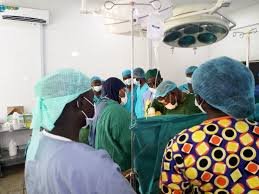Sightsavers, in collaboration with the Kaduna State Ministry of Health, has launched a specialised training programme for surgeons on hydrocele management in Zaria, aimed at improving treatment for one of the most common complications of lymphatic filariasis.
Hydrocele, a swelling in the scrotum caused by fluid around the testicle, is often linked to lymphatic filariasis, a parasitic disease spread through repeated mosquito bites. Though usually painless, the condition can cause severe discomfort and disability if untreated.
Speaking at the training, Professor Nuhu Dagu of the University of Jos explained that the programme seeks to standardise hydrocele surgeries in line with World Health Organisation (WHO) guidelines. While many doctors already have experience with the procedure, he noted that the updated WHO-endorsed techniques would help ensure safer, more consistent outcomes across hospitals.
The sessions, he said, include theory-based learning, practice on mannequins, and live surgeries. He also stressed that while surgery is effective, prevention through mass drug administration remains the most reliable strategy for controlling lymphatic filariasis.
Read also:
- Kaduna Government begins recruitment of instructors for newly commissioned vocational institute
- ICPC seeks forfeiture of N1.3B linked to Kaduna government officials hidden in Sterling Bank
- UK lifts Kaduna travel ban, signs fresh mutual accountability deal with Governor Uba Sani
Tabitha Kane, Senior Programme Officer at Sightsavers in Kaduna, said the initiative is part of a nationwide effort to strengthen the health system’s capacity to manage neglected tropical diseases. According to her, twelve surgeons are currently being trained eight from Kaduna and four from Kogi, while more than one hundred will undergo training nationwide. She urged men with symptoms of hydrocele to seek early medical care to prevent long-term complications.
Since 2019, Kaduna State has partnered with Sightsavers to provide free hydrocele surgeries. Sani Abdullahi, Mobility Management Officer for Neglected Tropical Diseases, revealed that over 2,000 patients have benefited from the programme. He noted that eighteen local government areas in Kaduna are endemic for lymphatic filariasis, though only three still require preventive chemotherapy.
Abdullahi described the training as a significant boost to healthcare delivery, equipping surgeons with modern WHO-approved techniques that would enhance patient care. He reaffirmed Kaduna’s commitment to eliminating neglected tropical diseases by 2030 and encouraged residents in endemic communities to embrace preventive drug campaigns.
The programme ensures that all hydrocele surgeries remain free of charge, making treatment accessible for men across affected areas and bringing the state closer to its public health goals.






